Division, 74, has finally found peace after the struggle of a lifetime. He proudly holds up the land title to a two-acre plot the Karnataka government has given him. Division — named after the sub-division office he was born next to, a naming convention common in the Hakki Pikki tribe to which he belongs — is among 114 people to have got land title deeds on August 12. He is one of the elders of the Hakki Pikki colony, located on the edge of the Bannerghatta National Park (BNP), about 36 km from Bengaluru, Karnataka.
The paper he holds came after over six decades of struggle of the Hakkipikki people, traditionally a semi-nomadic tribe of bird catchers and hunters, who settled down in this region sometime during the rule of Mysore Wadiyars, more than 100 years ago.
Allotment of land
Krishnappa, 65, a member of the Iruliga tribe, also nomadic people and forest produce gatherers, is the president of the Hakki Pikki and Iruliga Tribal Society. He says it was in 1962 that the Government of Karnataka allotted 350 acres of land for them to sustain themselves through agriculture.
“Our fathers and grandfathers divided this land among themselves and since then we have been growing ragi, avarekayi (hyacinth beans), horse gram, maize, and mustard among other crops. But for the longest time, the Forest Department claimed we were encroachers. We did not have titles of the land we tilled all our lives,” says Krishnappa, as he presides over the society’s weekly meeting in the colony. He adds that this created several hurdles in accessing government schemes, crop loss packages, and compensation for deaths caused due to elephant attacks, among others.
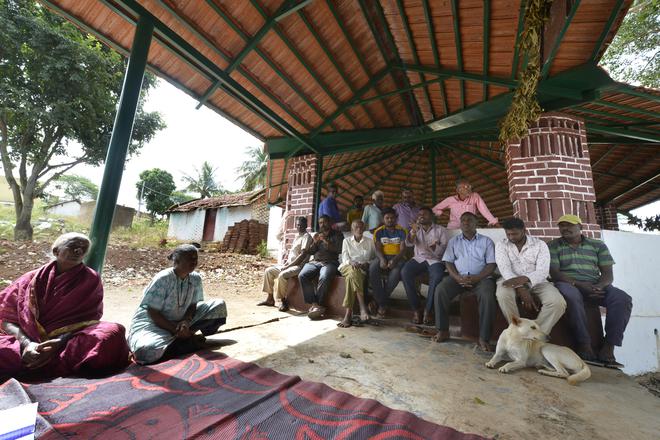
‘Encroachers, thieves’
Thus began the fight to secure land titles, which the community also sees as a validation of their identity. What worsened the situation was the Wildlife Act, 1972, and Bannerghatta wooded area being declared a National Park in 1974. This led to the criminalisation of these communities living on the edges of the forest.
“The 1970s and 1980s were hell for us. We were branded encroachers and thieves for going into our forest and even taking firewood. I remember one night very clearly. Forest guards barged into the village, banged on every door, threw chilli powder at many, beat us up — even children, women, and the seniors,” recounts Sakamma, in a quivering voice.
“I have fought a long battle, met every Chief Minister, voted for them with the hope they would solve our issues, but nothing came of it all. What sustained us were a few good officers, who were sympathetic to us. Once there was a drought and many of our families had migrated. Using this situation, the Forest Department wanted to bulldoze the village. Tipped off by a sympathetic officer, we got a few Iruliga families to settle in the village,” Division recalls. That is how Iruligas and Hakki Pikkis came to live together in the village.
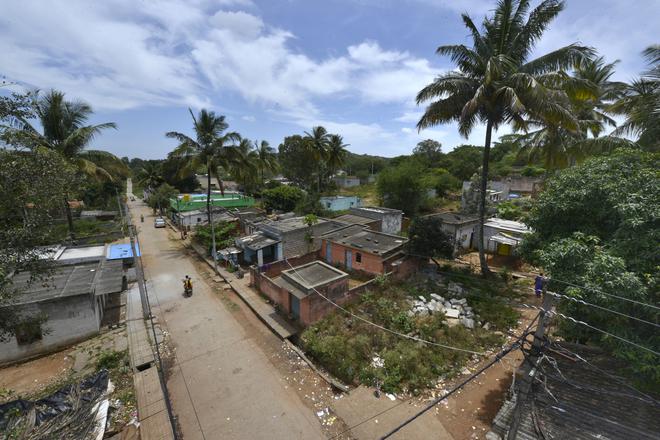
1962 denotification order
The struggle for land rights picked up steam in 1989, when Madhu Bhushan, an activist with the Society for Informal Education and Development Studies (SIEDS) started visiting the colony. “It was she who dug up the October 29, 1962, document which denotified 350 acres of forest land from Survey number 1 of Ragihalli State Forest,” says Attabhariya, a member of the Hakki Pikki and Iruliga Tribal Society. This implies that the land was no longer protected under forest laws.
“It has been a long fight against the red tape of the bureaucracy insensitive to tribal rights and the lack of political will. We have also faced several attempts by the land mafia to usurp the land, as it turned into prime real estate on the edge of the BNP, at the turn of the millennium as Bengaluru became the Silicon Valley of India. But what sustained us was that one document and a tenacious long legal fight,” Bhushan says.
Locating the land
The first step was to determine via a survey exactly where these 350 acres were, which the Forest Department refused to reveal and hand over to the Revenue Department. The biggest challenge was to get a joint survey by these two departments, which eventually began in 2002 but was again stalled. In 2010, the High Court of Karnataka also passed an order directing the State government to sort out the issue in favour of the tribespeople, but there was still no movement.
That’s when member of Parliament for Bengaluru Rural Lok Sabha constituency D.K. Suresh took the initiative. “We had been going to seek his help to get crop loss compensation from the Forest Department whenever wild elephants raided our farms. But since the department considered us encroachers, they never paid us any compensation. This brought the MP to our fight for title deeds. In 2015, Suresh sat on a protest forcing the Forest Department to hand over the files of 350 acres of land allotted to us to the Revenue Department,” said Srikanth, vice president of the tribal society.
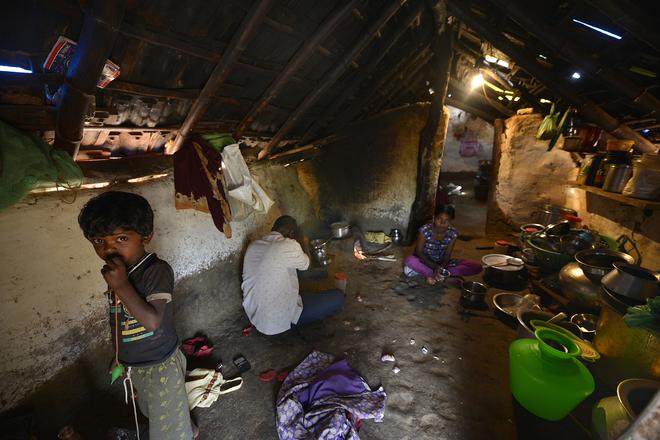
Finally the title deeds
However, it has been eight years since then and it was only on August 12, this year, that 114 families were finally given title deeds to 2-acre plots each. The title deed includes a clause that it cannot be alienated from its current use as agricultural land for the next 30 years, with the implication that it cannot be sold. “We had lost hope of ever getting these,” says Division.
However, there is some discontent over the government allotting plots through lottery. This has meant a plot a family has been tilling for decades has been allotted to someone else. There is also a plot of nearly 60 acres where the Forest Department has planted eucalyptus trees that have now been distributed to beneficiaries. “The way the lands have been allotted has led to a lot of quarrels among ourselves. We hope this is corrected,” says D. Ravikumar, a member of the Hakki Pikki tribe.
Apart from this, a few long-time residents of the colony are missing from the list of beneficiaries. Krishnappa and Srikanth have themselves not got land titles and hope they will get it in the second phase, when 28 plots of land will be distributed.
Another uphill battle
Next on the agenda of the tribes is getting the Hakki Pikki colony regularised. Only this will finally get the forest guards off their backs. The Forest Department considers the 20 acres with 250 houses, a school and other amenities created by the Social Welfare Department, an encroachment on the BNP.
“The fight to get the land titles for the farmlands has taken six decades. We hope the fight to get the village recognised as a revenue village will not take as long. Now that there is momentum, we are trying to get this sorted out,” says Bhushan.
“The village existed much before the Government of Karnataka allotted 350 acres of farmland to the community in 1962. It was sometime during the reign of the Mysore Wadiyars that our ancestors settled down here. However, there are no documents to support this,” says Division.
Other than saying, “The colony is an encroachment on the Bannerghatta National Park,” Prabhakar Priyadarshi, Deputy Conservator of Forests, BNP, refuses to comment further on the issue.
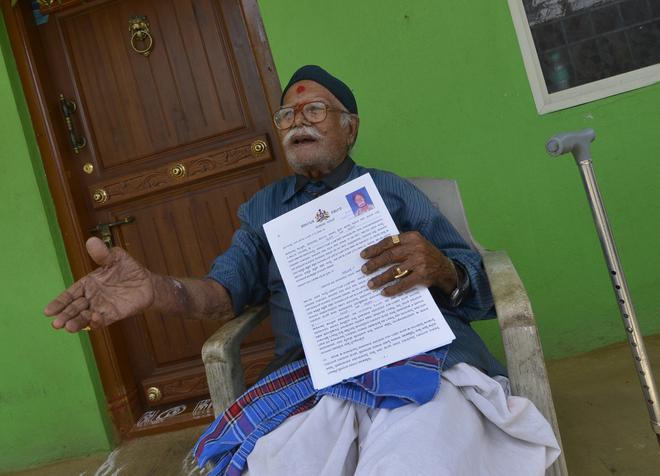
Behind electric fencing
The Forest Department has enclosed the colony with an electric fence, albeit to protect them from wild elephants. However, ever since the villagers and the local MP forced the department to hand over the 350 acres of land to the Revenue Department, the fence in several places has come closer to the colony, allege villagers.
“The Forest Department has given a letter to the gram panchayat saying the village is an encroachment of BNP, which has become a hurdle for us to access any government schemes,” alleged Srikanth. Moreover, the tribal community faces another problem as their colony lies in Anekal taluk of Bengaluru Rural district, while the 350-acre fields, a few kilometres away, are in Kanakapura taluk of Ramanagara district. “We are tired of going from pillar to post between Forest and Revenue departments and these two district authorities. It seems like we are in a no-man’s land,” he lamented.
However, the Forest Department insisted the colony be demolished, and the villagers shifted to the farmlands allotted to them and a new settlement be built there. The villagers say this is “unfeasible and unjust”. They say they cannot afford it. Plus, “The village came up much before the forest was notified as a national park and before we were allotted the 350 acres of farmland,” Krishnappa argues.
In August 2015, the Ministry of Environment and Forests held a public hearing in the Hakki Pikki colony and reportedly decided against relocating the village. However, the Forest Department sticks to its stand. “The next task is to follow up with MoEF and get the colony land also denotified,” says Bhushan.
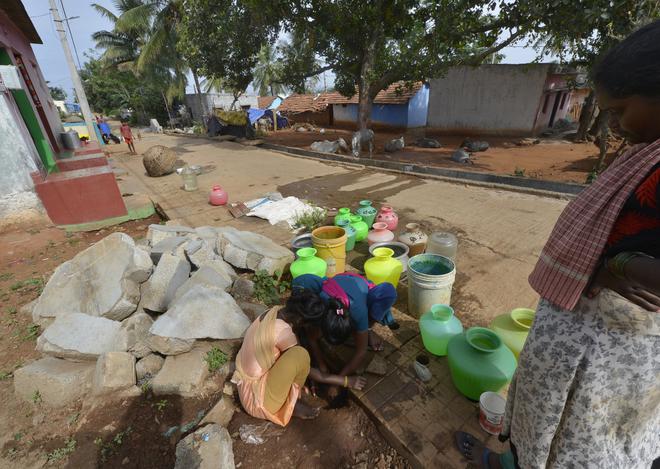
The road ahead
Given that now the villagers have got title deeds, they will now finally be eligible to access the benefits of all government schemes meant for farmers. “Presently, we are completely dependent on rains, but if the government digs more borewells under the Ganga Kalyana scheme, we may be able to grow two crops a year, unlike now. We also need help in marketing our produce,” says Krishnappa. He adds that elected representatives need to find a lasting solution to the village’s drinking water problem. Women standing in long queues and quarrelling over filling water in plastic pots is a common sight.
The village also hopes for better facilities to educate children. “The sole school in the village is only till Class V. Living in such close proximity to Bengaluru, none of our children have gone to college. There are no good primary health facilities as well,” says Samid Kumar, a member of the Hakki Pikki tribe. Ravishekhara, another member of the tribe, who works as a cab driver in Bengaluru, says cottage industries like candle and agarbatti making in the village could help them find employment locally.
But what villagers want most is a restoration of their organic relationship with the forest.
“Even today we are not allowed to enter the forest, where we have grown up and have generational knowledge and connect. Recently a boy got bitten by a snake, for which we traditionally used medicine from forest herbs. But we were not allowed to get into the forest to access those herbs and the mother had to rush the boy to a hospital, where she spent over ₹2 lakh to save him, and is now caught in a debt trap. Two months after the incident, the boy is not fully cured yet,” laments Attabhariya, who works as a forest guard himself with a private agency that is on a labour contract with the Forest Department.
He hopes that the government will recognise the tribes as legitimate dwellers of the land.







